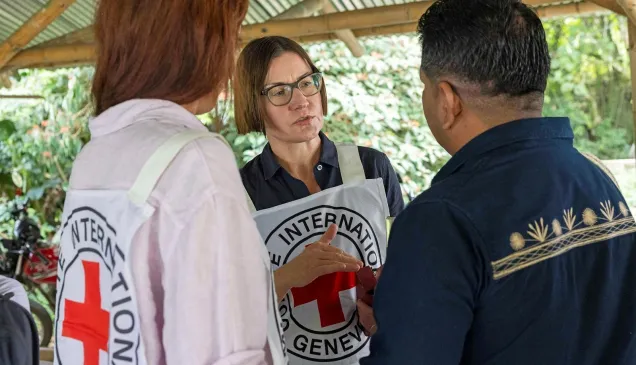United Nations, General Assembly, 69th session, Sixth Committee, item 83 of the agenda, statement by the ICRC, New York, 15 October 2014.
The International Committee of the Red Cross (ICRC) is grateful for the opportunity to address the Sixth Committee on this important item.
Universal Jurisdiction plays a vital role in the effective enforcement of International Humanitarian Law (IHL). States bear the primary responsibility for preventing impunity and bringing to justice alleged perpetrators of serious violations of IHL. States are under an obligation to investigate and prosecute such crimes, whether committed by their own nationals, in their own territory, or otherwise under their jurisdiction. Where States are unable or unwilling to prosecute alleged perpetrators in their territory or under their jurisdiction, and when international courts cannot exercise jurisdiction, the exercise of universal jurisdiction by other States, offers a subsidiary basis for ensuring accountability and addressing the impunity gap.
The Geneva Conventions of 1949 and Additional Protocol I of 1977 establish mandatory universal jurisdiction over those violations defined as grave breaches. Other international instruments, such as The Hague Convention for the Protection of Cultural Property (1954) and its Second Protocol (1999), the Convention against Torture (1984), and the International Convention for the Protection of All Persons from Enforced Disappearance (2006), similarly recognize that States must assert universal jurisdiction to prosecute serious violations of the Conventions including in an armed conflict. Under customary IHL, States can exercise universal jurisdiction over war crimes committed during international and non-international armed conflicts.
The ICRC is pleased to note that many States have established some form of universal jurisdiction over serious violations of IHL in their national legal systems. Most of these States have adopted legislation granting such jurisdiction over any or a combination of grave breaches of the Geneva Conventions and Additional Protocol I, as well as violations of other instruments and the war crimes listed in the International Criminal Court Statute. Recent national court decisions and legal initiatives by States have also demonstrated how the principle of universal jurisdiction can be applied in practice.
The ICRC notes that most States, when establishing universal jurisdiction over war crimes, have attached certain conditions to its exercise. Most common is the requirement of a link between the accused and the forum State, like the presence of the accused in the prosecuting State, or the consent of a governmental authority. This trend is highlighted in the ICRC’s submission to the Secretary-General’s report pursuant to General Assembly resolution 68/117(2014).
While recognizing the will of States to better frame the application of universal jurisdiction, the ICRC is convinced that the conditions for opening criminal proceedings, or for justifying a refusal to do so, should be clearly defined at the national level. Such conditions should strengthen the effectiveness and predictability of the principle of universal jurisdiction, rather than limit its application.
The ICRC is aware of the major challenges associated with the implementation of universal jurisdiction whether technical, legal, practical or in terms of resources. Given these challenges, we deem it essential that States keep investing in national capacity building and the enactment of appropriate national legislation to prosecute war crimes on the basis of both national and extraterritorial jurisdiction, including universal jurisdiction.
This will deter such crimes from being committed and allow perpetrators to be prosecuted when violations occur. States should also improve international judicial cooperation and assistance by affording one another the greatest possible assistance in criminal proceedings brought in respect of international crimes.
Promoting the prevention and repression of war crimes is among the primary activities of the ICRC’s Advisory Service on IHL. Universal jurisdiction is an important aspect of this process. The ICRC has thus developed expert legal and technical resources on relevant State practice through its databases on customary IHL and national implementation, as well as its manual on domestic implementation of IHL.
The ICRC reaffirms its willingness to support States in their efforts to build an effective system against impunity.



